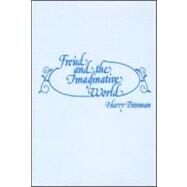- ISBN: 9780881630282 | 0881630284
- Cover: Hardcover
- Copyright: 4/1/1985
The current resurgence of interest in the scientific origins of psychoanalysis has overshadowed the artistic and literary models to which Freud had recourse time and again in the development and presentation of his theories. It is this neglected aesthetic wellspring of psychoanalysis to which Harry Trosman calls attention in Freud and the Imaginative World. Trosman enriches our understanding of psychoanalysis by demonstrating how Freud's cultural and humanistic commitments guided his pursuit of a science of mind. Toward this end, he undertakes a number of challenging tasks: to situate Freud in the formative culture of his time, to adumbrate the human concerns that infromed his work in the natural sciences, and to delineate the multiple "modes of influence" that fostered his creativity. The second part of the book moves from the cultural sources of Freud's creativity to the psychoanalytic contribution to our understanding of art and literature. Here, Trosman focuses on the consumer of art and literature, tracing psychoanalytic perspectives on aesthetic responsiveness from Freud to the present. Trosman's critical review of the da Vinci and Hamletliterature illustrates the limitations as well as the explanatory potential of the two principal genres of applied psychoanalytic work, and leads naturally to the reflective estimation of psychoanalysis and creativity that concludes the work. Throughout, Trosman is a well-informed and engaging guide, both to the imaginative Freud and to the abundant literature on psychoanalysis and the arts. He documents Freud's continuing indebtedness to the literary models that nourished his theorizing and gave shape to his narrative clinical expositions, even as he takes pains to show how psychoanalysis has, in many ways, outgrown Freud's own reductive explanations of aesthetic phenomena. A skillfully crafted overview, Freud and the Imaginative Worldis an exemplary introduction to a crucial aspect of the Freudian legacy.







